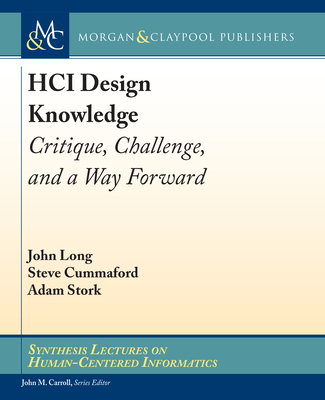Toward Engineering Design Principles for HCI
暫譯: 邁向人機互動的工程設計原則
Long, John, Cummaford, Steve, Stork, Adam
- 出版商: Morgan & Claypool
- 出版日期: 2022-03-25
- 售價: $2,450
- 貴賓價: 9.5 折 $2,328
- 語言: 英文
- 頁數: 234
- 裝訂: Quality Paper - also called trade paper
- ISBN: 1636393500
- ISBN-13: 9781636393506
-
相關分類:
交互設計 Interaction-design
海外代購書籍(需單獨結帳)
相關主題
商品描述
This is the second of two books by the authors about engineering design principles for human-computer interaction (HCI-EDPs). The books report research that takes an HCI engineering discipline approach to acquiring initial such principles. Together, they identify best-practice HCI design knowledge for acquiring HCI-EDPs. This book specifically reports two case studies of the acquisition of initial such principles in the domains of domestic energy planning and control and business-to-consumer electronic commerce. The book begins by summarising the earlier volume, sufficient for readers to understand the case studies reported in full here.
The themes, concepts, and ideas developed in both books concern HCI design knowledge, a critique thereof, and the related challenge. The latter is expressed as the need for HCI design knowledge to increase its fitness-for-purpose to support HCI design practice more effectively. HCI-EDPs are proposed here as one response to that challenge, and the book presents case studies of the acquisition of initial HCI-EDPs, including an introduction; two development cycles; and presentation and assessment for each. Carry forward of the HCI-EDP progress is also identified.
The book adopts a discipline approach framework for HCI and an HCI engineering discipline framework for HCI-EDPs. These approaches afford design knowledge that supports "specify then implement" design practices. Acquisition of the initial EDPs apply current best-practice design knowledge in the form of "specify, implement, test, and iterate" design practices. This can be used similarly to acquire new HCI-EDPs. Strategies for developing HCI-EDPs are proposed together with conceptions of human-computer systems, required for conceptualisation and operationalisation of their associated design problems and design solutions.
This book is primarily for postgraduate students and young researchers wishing to develop further the idea of HCI-EDPs and other more reliable HCI design knowledge. It is structured to support both the understanding and the operationalisation of HCI-EDPs, as required for their acquisition, their long-term potential contribution to HCI design knowledge, and their ultimate application to design practice.
商品描述(中文翻譯)
這是作者關於人機互動工程設計原則(HCI-EDPs)的兩本書中的第二本。這些書籍報告了採用HCI工程學科方法來獲取初步原則的研究。它們共同確定了獲取HCI-EDPs的最佳實踐HCI設計知識。本書特別報告了在家庭能源規劃與控制以及商業對消費者電子商務領域中獲取初步原則的兩個案例研究。本書首先總結了前一卷的內容,使讀者能夠理解這裡完整報告的案例研究。
兩本書中發展的主題、概念和思想涉及HCI設計知識、對其的批評以及相關挑戰。後者表達為HCI設計知識需要提高其適用性,以更有效地支持HCI設計實踐。HCI-EDPs在此被提出作為對該挑戰的一種回應,本書展示了獲取初步HCI-EDPs的案例研究,包括介紹;兩個開發週期;以及每個的展示和評估。HCI-EDP進展的延續也被確定。
本書採用HCI的學科方法框架和HCI-EDPs的HCI工程學科框架。這些方法提供了支持「先規範再實施」設計實踐的設計知識。初步EDPs的獲取應用當前最佳實踐設計知識,形式為「規範、實施、測試和迭代」的設計實踐。這也可以類似地用於獲取新的HCI-EDPs。提出了發展HCI-EDPs的策略,並與人機系統的概念相結合,這對於其相關設計問題和設計解決方案的概念化和操作化是必需的。
本書主要針對希望進一步發展HCI-EDPs理念及其他更可靠的HCI設計知識的研究生和年輕研究人員。它的結構旨在支持HCI-EDPs的理解和操作化,以便於其獲取、對HCI設計知識的長期潛在貢獻以及最終應用於設計實踐。






![CMMI for Outsourcing: Guidelines for Software, Systems, and IT Acquisition[Hardcover]-cover](https://cf-assets2.tenlong.com.tw/products/images/000/034/746/medium/51GMcWVt6EL.jpg?1525860226)









